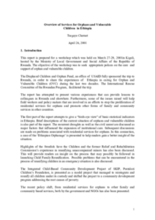This report is prepared for a workshop which was held on March 27-29, 2001 in Kigali, hosted by the Ministry of Local Government and Social Affairs of the Republic of Rwanda. The objective of the workshop was to seek appropriate polices on the care and support of orphans and vulnerable children.
The Displaced Children and Orphan Fund, an office of USAID fully sponsored the trip to Rwanda, in order to share the experiences of Ethiopia in caring for Orphan and Vulnerable Children (OVC) during the last two decades. The International Rescue Committee of the Rwandan Program, facilitated the trip.
The report has attempted to present various experiences that can provide lessons to colleagues in Rwanda and elsewhere. Furthermore, some of the issues raised will help field workers and policy makers that are involved in an efforts to stop the proliferation of residential services for orphans and promote other forms of family and community services in other countries.
The first part of the report attempts to give a “birds eye view” of basic statistical indicators in Ethiopia. Brief descriptions of the current situation of orphans and vulnerable children is also part of the report. The recurrent droughts as well as the civil unrest are discussed as major factors that influenced the expansion of institutional care. Subsequent discussions are made on problems associated with residential services for orphans. In this connection, a case of the ‘Ethiopian Orphanage’ is presented to help readers gain a better insight of the situation.
Highlights of the Swedish Save the Children and the former Relief and Rehabilitation Commission’s experience in reunifying unaccompanied minors has also been discussed. This will provide readers an insight on the process that may possibly be followed in launching Child Family Reunification. Possible problems that can be encountered in the process of reunifying children in an emergency situation is also discussed.
The Integrated Child-Based Community Development Project of SKIP, Pestalozi Children’s Foundation, is presented as a model project that managed to reintegrate and reunify all children under its custody and shifted the project to a community development program addressing the root causes of poverty. The recent policy shift, from residential services for orphans to other family and community based services, both by the government and NGOs, has also been presented.

